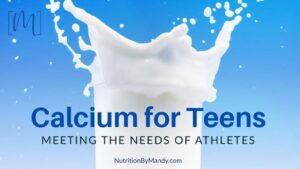Last Updated on November 12, 2023 by Mandy Tyler, M.Ed., RD, CSSD, LD
Have you ever taken a supplement containing beta-alanine and started to itch or tingle? You may have wondered what’s going on and if this is normal.
Let’s first take a look at what beta-alanine is and why it is used as a supplement in sport. Then we will examine why beta-alanine may be making you itch.
What is Beta-Alanine?
Beta-alanine is a non-essential amino acid the body produces in the liver. In the body beta-alanine combines with another amino acid, L-histidine, to form carnosine (1).
Why Take Beta-Alanine as a Supplement?
The goal of beta-alanine supplementation is to increase the muscle concentration of carnosine.
Muscle tissue has high concentrations of L-histidine, the other amino acid needed to form carnosine, but low concentrations of beta-alanine. Therefore, beta-alanine is considered to be the rate limiting factor for the formation of carnosine in the muscle (2).
Consequently, supplementing with beta-alanine provides the muscle tissue with the limiting amino acid needed for carnosine to be formed (1).

Performance Benefits of Beta-Alanine Supplementation
During high-intensity exercise, carnosine serves as a buffer to the build-up of hydrogen ions from lactic acid in the muscle. A build-up of hydrogen ions will lead to changes in muscle pH, which results in muscle fatigue (1, 2).
Thus, buffering against changes in muscle pH can have a beneficial impact on performance, particularly in short-duration exercise lasting 0.5-10 minutes (3).
How Much Beta-Alanine Should I Take?
To increase carnosine concentrations in muscle tissue, research suggests athletes should consume 4 – 6 grams per day of beta-alanine. The daily beta-alanine supplement dose should be divided into smaller amounts (≤ 2 grams) taken over the course of the day (1).
This supplementation regimen should be done daily for at least 2 – 4 weeks to load the muscle with beta-alanine (1).
Food Sources of Beta-Alanine
In addition to being produced by the liver, we also get beta-alanine from the food we eat. Protein-rich foods, such as chicken, turkey, red meat, pork, and fish, all contain beta-alanine.
Unfortunately, the amount of beta-alanine in protein-rich foods is minimal compared to the suggested supplementation regimens for beta-alanine.
For example, to get 6.4 grams of beta-alanine from chicken breast, an individual would need to eat 3.5 pounds (1.6 kg) of chicken (4).
Now that you understand why beta-alanine is taken as a supplement, let’s discuss why it may make you itch.
Why Does Beta-Alanine Make You Itch?
The most common side-effect related to beta-alanine supplementation is paresthesia. Paresthesia is an itching, tingling, or prickling sensation athletes feel on the skin. Athletes may describe this as a “pins and needles” feeling.
Individuals commonly feel the paresthesia sensation from the beta-alanine on the back of the hands, face, and neck. Typically, the paresthesia does not last long, going away 60-90 minutes after the supplement is taken (1).

How to Reduce Beta-Alanine Itch?
The paresthesia sensation experienced with beta-alanine supplementation is commonly related to the dose. Higher doses of beta-alanine are more likely to result in the itching or tingling effect than lower doses (1).
To reduce paresthesia, athletes can take several smaller doses of beta-alanine (0.8-1.6 g or less) every 3-4 hours throughout the day (3).
Another option is the use of a sustained-release beta-alanine supplement. A sustained-release formula can help minimize the paresthesia side effect (1).
Does Beta-Alanine Itch Mean It’s Working?
Not all individuals who take beta-alanine as a supplement experience paresthesia (1). Thus, experiencing tingling or itching sensation is not a sign the supplement is working.
As previously discussed, higher doses of beta-alanine are more likely to cause paresthesia.
There is also currently no evidence to suggest the paresthesia effect is harmful. However, it is important to be aware that research on long-term supplementation (>12 months) of beta-alanine is lacking (1).
Why is My Pre-Workout Supplement Making Me Itch?
Many pre-workout supplements contain beta-alanine as an ingredient (1).
The amount of beta-alanine included in the supplement varies widely by brand. Some pre-workout supplements may contain up to 4 grams of beta-alanine per serving.
Thus, if you are experiencing an itching or tingling sensation after taking your pre-workout supplement, it is likely related to the beta-alanine content.
If you are using a pre-workout supplement as your source of beta-alanine, evaluate if the quantity contained in the supplement is sufficient to increase muscle carnosine levels as discussed above.
Evaluating Supplements with Beta-Alanine
It is important to use caution with any sports supplement you are looking at taking. Dietary supplements have the risk of being contaminated by banned substances.
When reviewing a beta-alanine supplement or pre-workout supplement, considerthe items discussed below.
Is the supplement third-party tested?
The Food and Drug Administration does not regulate sports supplements in the same way that food is regulated.
Supplements that are third-party tested have an outside organization evaluate the supplement for accuracy of ingredients.
Two companies that evaluate sports supplements are NSF International Certified for Sport and Informed Sport.
Does the supplement contain a proprietary blend?
Many supplements contain a proprietary or confidential blend of ingredients. The supplement label will typically list the ingredients within the blend, but not amounts.
Use caution with proprietary blends. If a product label does not tell you the name of the ingredient and the amount included, you cannot evaluate the potential effectiveness of the product.
Bottom line, if you don’t know what’s in the supplement, don’t take it.
Are the dosages of ingredients included in the supplement based on research?
Another key point is to review the supplement label to determine the amount of each ingredient contained in the product. It is common to find mega-doses of vitamins and other nutrients in sport supplements.
Also use caution if you are taking multiple supplements containing the same ingredients, as this could result in consuming overly high doses of vitamins or other ingredients.
Keep in mind, taking a dietary supplement alone is not going to improve performance. It must be combined with a well-planned strength and conditioning program as well as a sports nutrition meal plan.

Stay Informed on Sports Nutrition
You now know what is causing the itching sensation when taking a beta-alanine supplement.
As an athlete it is important to stay informed and ask questions when it comes to sports nutrition and supplements. Visit with a sports dietitian nutritionist who can answer your questions and assist with developing a customized sports nutrition meal plan.
For additional sports nutrition recommendations for athletes check out my blog, Your Guide to Game Day Nutrition.
Join the Nutrition By Mandy Email List & Get a Free Athlete’s Grocery List
Click HERE to join the Nutrition By Mandy e-mail list. When you join you will receive a free athlete’s grocery list to print and take with you to the store.
About the Author
Mandy Tyler is a Sports Dietitian Nutritionist in the San Antonio, TX area. She is a Registered and Licensed Dietitian, a Board-Certified Specialist in Sports Dietetics, a Licensed Athletic Trainer, and is a Certified Exercise Physiologist through the American College of Sports Medicine. Mandy has experience working with athletes at the high school, collegiate, and professional levels. She believes the key to reaching one’s full potential, both in everyday life and in sports performance, relies on a healthy nutritional foundation.





